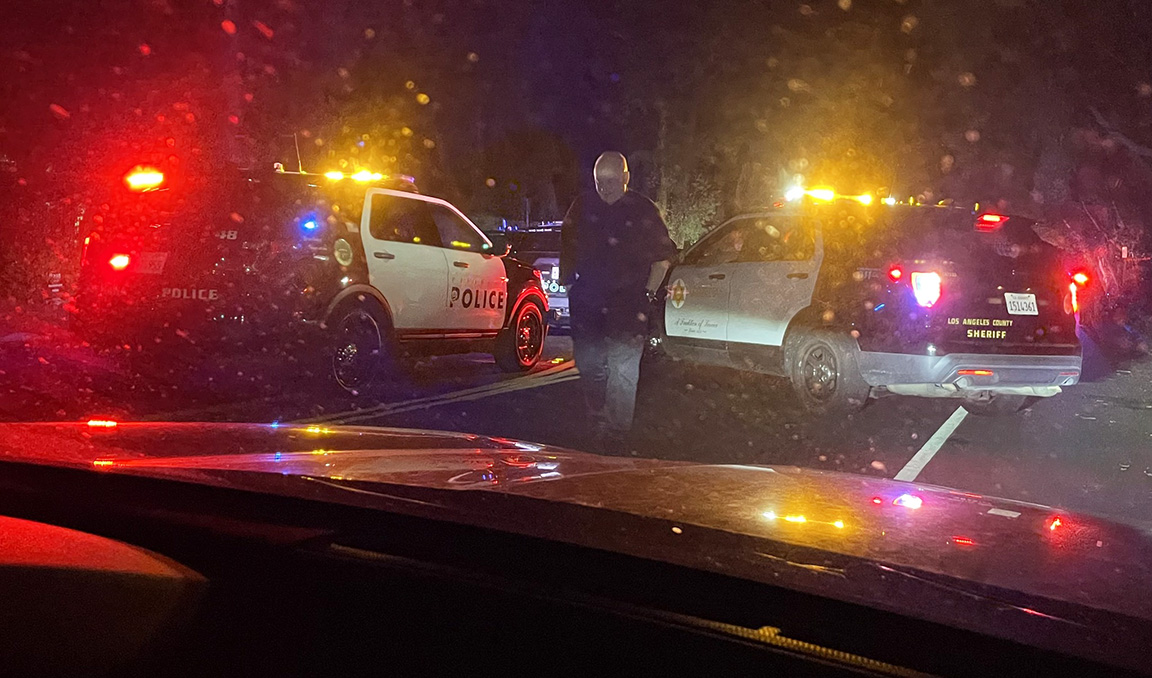
This is my Maundy Thursday story. Kathy and I returned from our Holy Wednesday evening dinner at Denny’s to find about a dozen police cars in front of our home, your episcopal residence, on California Blvd. Near our neighbor’s house, a few feet from our easterly driveway, we could see a man of African descent standing next to the curb and holding something in his right hand. He was shouting angrily. Officers were yelling at him to put the weapon down. Several were standing in the open, so one assumes it wasn’t a gun.
We live in an unincorporated part of east Pasadena called Chapman Woods. While some Pasadena PD units were there, LA county sheriff’s deputies took the lead. They let us use our westerly driveway to get in. After parking, I walked to the other driveway and found a spot about 20 feet from where the man was standing, on the other side of a vine-enmeshed fence. When I tried to peer around to see him, a deputy told me to go inside. I stepped back a few steps, put the clerical tab back in my shirt and my pectoral cross outside my sweater, and held my hands together in a sincere posture of prayer. He let me stay.
My newshound instincts failed. I didn’t take photos. Kathy took one from the car. I considered calling Channel 4 but decided I had no business injecting another factor into a potentially deadly situation. They’d only have been able to see from a chopper anyway. The police had stopped traffic. We must’ve only gotten onto California off Madre, the closest north-south street, because the incident had just begun.
I thought of the temple guards coming for Jesus in the garden of Gethsemane. For a half hour, I prayed harder than I ever had. I prayed every prayer I knew and kept praying. I gave thanks for how our Commission on Gospel Justice and Community Care, under the leadership of Sister Patricia Scott Terry, had advocated for non-armed response when someone is suffering from mental illness. I lamented the extra risk men of color face when mental illness makes them act out on the streets. I prayed that the gentleman would put his weapon down and Jesus would attend him and spread a cloak of protection over everyone. I imagined everyone in the street, especially the man, as babies in their mothers’ arms.
My hearing is poor, so I couldn’t distinguish much of what the man was saying, except “no” when they said “put it down.” Then their voices, not just one gender and surprisingly calm, almost gentle, came closer. “What’s your name?” “We just want to help.” “Just put it down.” As they neared, he shouted louder and more desperately. It seemed silly to pray for no gunshots, but I did. I heard a scuffle. After a moment, the deputy across the street who’d been keeping an eye on me stood down. I peered around as they arrested him. He was still shouting. He was shouting from the car as they drove away, which was reassuring because, I thought, it meant he probably wasn’t hurt. Colleagues and I are trying to find him to see if we can help. I also want to thank the officers for keeping their cool.
But this is still a Maundy Thursday story. The temple guards were delivering the man into a system that, as with Jesus after he was arrested, isn’t prepared to do him justice. It’s not the fault if the officers or jailers. It’s on each of us. It’s on the ones in the crowd who cry for vengeance. It’s on citizens in one of the richest communities in the richest country in the world who haven’t demanded that all our people receive the care they deserve, not just when they’re sick with cancer or Alzheimer’s disease but also with mental illness and addiction.
We haven’t reached a consensus in our country that all political and police power is dangerous without love. But it is. And it’s our story to tell – yours, mine, all who love our stricken, risen savior. And he feeds and strengthens us for the work each day. In the reading appointed for today from St. Paul, we get the Bible’s earliest account of the last supper. Jesus says, “This is my body that is for you.” This brilliant expression of cosmological truth is the heart of our faith. “The wheat, the grapes, you me, my Father, my mother, everyone” – all one, all from the love of the creator at the beginning, all going home to the same creator. “This is my body, this is you, this is us, this is the world, this is the universe – we are stardust.” Pretty smart for the first century. But hey, he was Jesus. And in John’s gospel’s account of the same dark night in Jersusalem, he commands his apostles to love and serve one another so that, by their actions, an unbelieving world will know the nature of its creator as the omnitude of love.
In the 21st century, secularism is in the ascendant, and we must make our peace with it. People aren’t as interested as they used to be in our doctrines and denominations. But this will never absolve us of our responsibilities as people of faith – people who by grace know that all creation was made in love, saved in love, and bathed in love. We are entitled and required to speak up and stand against any ideology, doctrine, platform, or policy, including the principles governing law enforcement and our justice system, if their proponents can’t identify their antecedents in the alpha, the omega, the universal law of love. When it comes to the primacy of love, there can be no separation of church and state.
